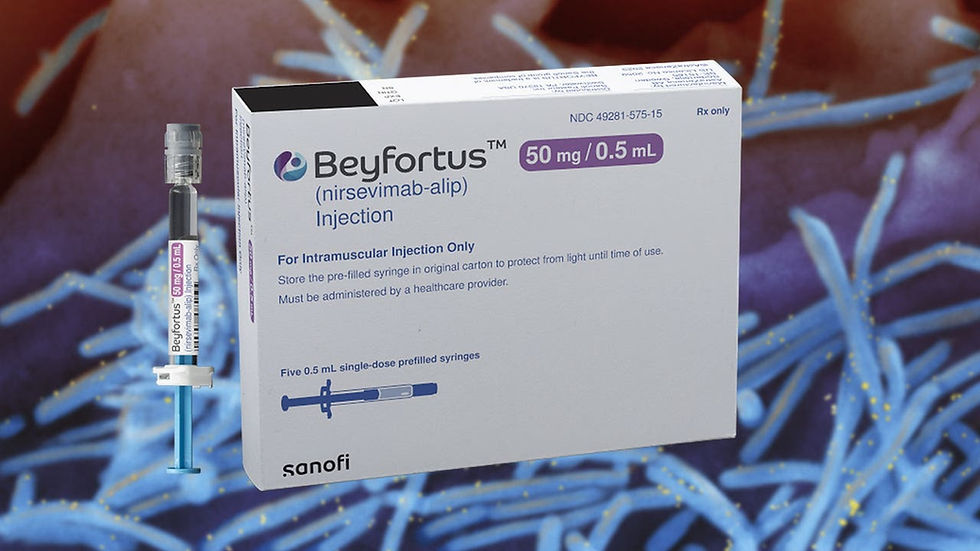Nirsevimab: A New Hope for RSV
- Sara Deo

- Aug 14, 2024
- 2 min read
What is RSV?
RSV, respiratory syncytial virus, causes infections of the lungs and respiratory tract. It is so common that most children have been affected by the virus by the age of 2. It can also affect adults and older, healthy children. The symptoms are mild and typically mimic the common cold, including a congested or runny nose, dry caught, low-grade fever, sore throat, sneezing, and headaches. Self-care measures tend to be all that is needed to relieve any discomfort or symptoms.

Severely Affected Groups
However, as common as it is, RSV can also cause severe infection in some people, including babies 12 months and younger (infants), especially premature infants, older adults, people with heart and lung disease, or anyone with a weak immune system. The infection can spread to the lower respiratory tract and cause pneumonia or bronchiolitis (inflammation of the small airway passages entering the lungs). Some symptoms may include:
Fever
Severe cough
Wheezing
Rapid Breathing or Difficulty Breathing
Bluish color of the skin due to lack of oxygen (cyanosis)
While adults and the elderly can be severely affected by RSV, infants have the potential to suffer the most. Most children and adults recover in one to two weeks, although some might have repeated wheezing. The chances of a hospital stay may increase in premature infants or anyone with chronic heart or lung problems.
A Solution: Nirsevimab
A new study released in November 2023, showed that Nirsevimab, a long-acting monoclonal antibody product, was highly effective in protecting infants from hospitalizations associated with RSV. As RSV cases spiked in 2023, it was crucial to protect infants in their first RSV season by giving them Nirsevimab if the mother did not receive the maternal RSV vaccine during pregnancy. March 2024 was the first time Nirsevimab was available to protect infants from severe RSV.
How it Works
The study observed 699 infants from October 2023 to February 2024 using data from the CDC’s New Vaccine Surveillance Network, a population-based surveillance program that monitors respiratory viruses to examine immunization effectiveness. The results showed that Nirsevimab was 90% effective at preventing RSV-related hospitalizations in infants during the first RSV season. Although the Nirsevimab effectiveness may be lower during a full RSV season, (October through March), with its increasing availability and growth, the CDC will be able to tackle this issue. Nirsevimab is a monumental advancement for infants chronically suffering from the tolls of RSV. It is preventing hundreds of individuals from being hospitalized, leading to a prolonged quality of life.
Citations
CDC Newsroom. (2016, January 1). CDC. https://www.cdc.gov/media/releases/2024/s0307-rsv-immunization.html
Respiratory syncytial virus (RSV) - Symptoms & causes - Mayo Clinic. (2023, October 4). Mayo Clinic. https://www.mayoclinic.org/diseases-conditions/respiratory-syncytial-virus/symptoms-causes/syc-20353098
RSV research: Nirsevimab 80% effective against hospitalization. (2024, June 7). CIDRAP. https://www.cidrap.umn.edu/respiratory-syncytial-virus-rsv/rsv-research-nirsevimab-80-effective-against-hospitalization




Comments